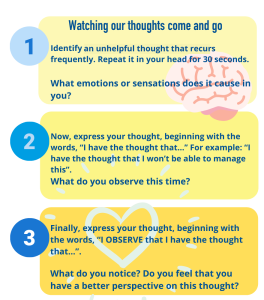TAKING YOUR MENTAL HEALTH TO HEART
Learning to understand your thoughts
TAKING YOUR MENTAL HEALTH TO HEART
Learning to understand your thoughts
Authors: AMÉLIE SEIDAH, PHD, AND ISABELLE GENINET, PHD, PSYCHOLOGISTS
Have you ever noticed how many thoughts pop into your head in a day?
“Am I going to be late?”
“Will I manage to hand in my assignment on time?”
Even though we can’t always control our thoughts, we can control how we react to them. In other words, instead of believing that all of our thoughts are true, we can learn to ask ourselves if they are accurate and helpful.

TELLING HELPFUL THOUGHTS FROM UNHELPFUL THOUGHTS
![]() Some thoughts help us solve problems:
Some thoughts help us solve problems:
“I should start studying for my history exam that’s coming up in a few days.’’
“I miss my friend Léa… I’ll text her tonight.”
These helpful thoughts draw our attention to a need that exists right now and motivate us to take action. They encourage us to find solutions.
![]() Other thoughts just make us feel bad:
Other thoughts just make us feel bad:
“It was dumb of me to make a mistake like that.”
“There’s no point in trying—I’ll never succeed.”
These are unhelpful thoughts: they take over our minds and drain our energy.
These thoughts aren’t helpful because they focus our attention on things that have already happened or that might not happen at all.
They don’t help us solve problems. Instead, they tend to drag us down and paralyze us with worry.
TWO STRATEGIES FOR DEALING WITH UNHELPFUL THOUGHTS
The problem with unhelpful thoughts is that we give them too much power over us. But not all our thoughts are important, true, useful, and worth paying attention to. Instead of believing everything we think, we can learn to challenge our thoughts.
Important!
The idea here isn’t to force ourselves to think more positively or realistically, but rather to get in the habit of asking questions about our thoughts to determine if they’re accurate, realistic, and helpful. This can help us take a step back and change our perspective on a situation.
Challenging our unhelpful thoughts
Here are some examples of questions that you can ask yourself to MAKE YOUR PARASITIC THOUGHTS MORE NUANCED:
• What is the evidence that proves that this thought is true?
• Is there evidence that the opposite is true?
• Are there other possible explanations?
• What would I say to a friend who had the same thought as me?
• What’s the worst case scenario?
• If the worst case scenario happened, would I be able to get through it?
• How does this thought make me feel?
• Does this thought help me feel better?
We can also practise simply watching our unhelpful thoughts come and go, without focusing on them. Here’s a short exercise that will help you do this:
In summary...
There are a few different things you can do when unhelpful thoughts take over your mind. Here’s a short guide you can use to help tell helpful thoughts from unhelpful thoughts and pick the right strategy for your situation. With practice (and a little patience), you’ll get there! 😉
GuideIn this video, students talk about their anxiety around academic performance and how they manage their stress:
Need to talk about how you feel?
Talk to a Tel-Jeunes worker: It’s anonymous, free, and accessible 24/7

About the contributors’ book
TOUT savoir pour composer avec les turbulences à l’adolescence – Isabelle Geninet, PhD, and Amélie Seidah, PhD, psychologists
This practical guide aims to help teens get to know themselves better, develop better critical thinking and improve their self-observation skills. With concrete strategies and helpful advice, teens will learn how to cultivate a positive attitude (e.g., openness, curiosity, flexibility) and, above all, understand the importance of taking action. And this, in turn, will help them feel better equipped to deal with life’s ups and downs… and cope with the emotional turbulence of adolescence!
BUY THE BOOK ↗
Our partner
Les Éditions Midi trente offers practical books and helpful intervention tools aimed at helping people young and old overcome challenges and foster their potential.



